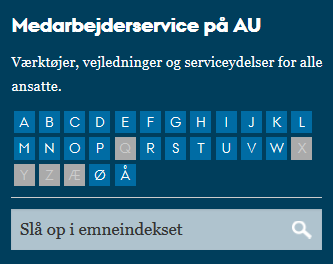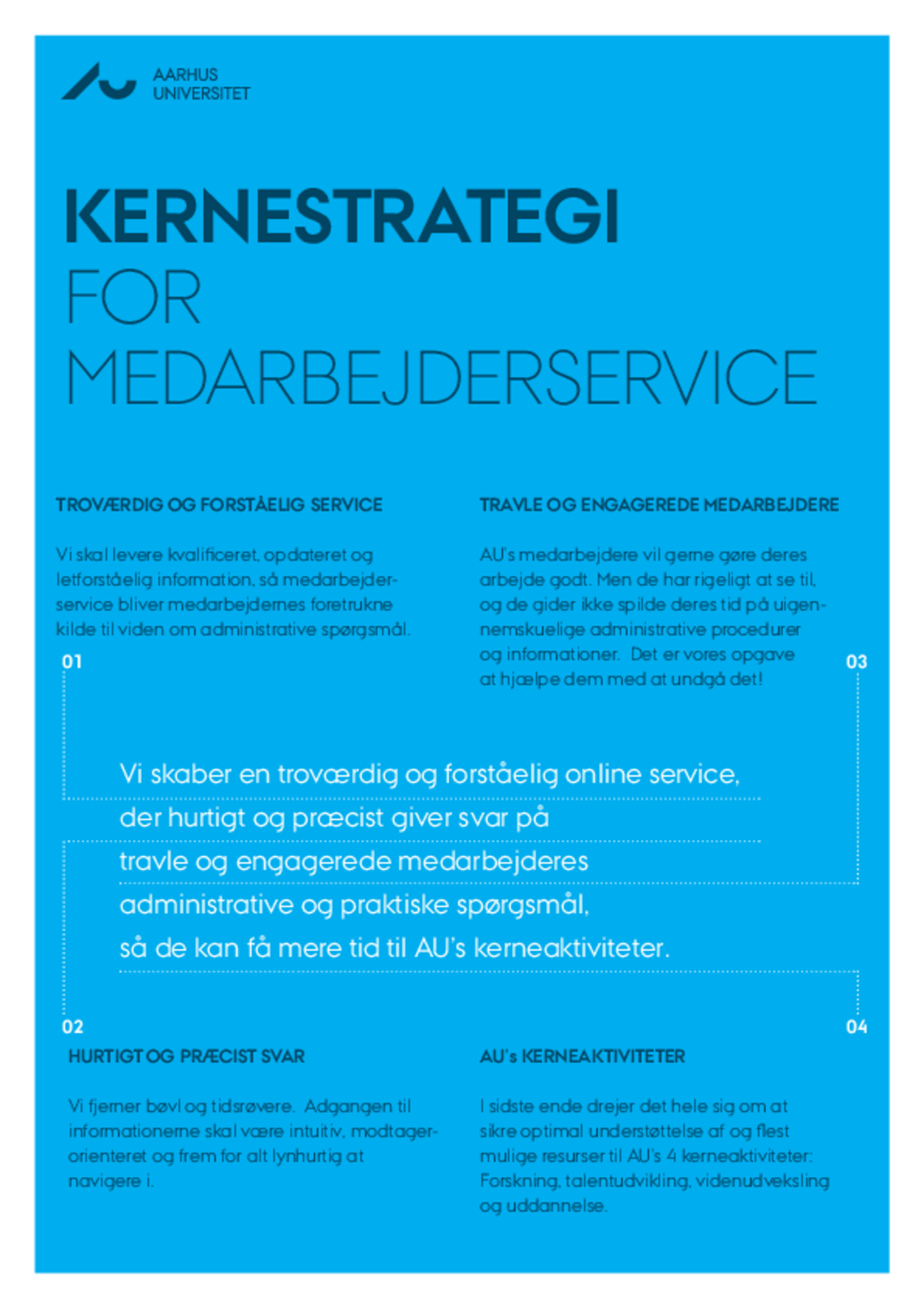Guidenlines for staff service
Staff service is the administration's tools, guides, and services for all staff at AU. If you are a coordinator or web editor for staff service, you can find a range of useful information here to help you manage this task.
Strategy and organization
1. Core strategy for staff services
There is a core strategy for Staff Services that is important for you as a coordinator or web editor to be aware of.
Core strategy
We create a credible and understandable online service that quickly and accurately answers busy and engaged staff members administrative and practical questions, allowing them more time to focus on AU’s core activities.
Credible and understandable service
We must provide qualified, updated, and easily understandable information, making staff services the preferred source of knowledge for administrative questions.
Quick and accurate answers
We eliminate hassles and time-wasters. Access to information should be intuitive, recipient-oriented, and, above all, extremely fast to navigate.
Busy and engaged staff
AU’s staff want to perform their work well. However, they have plenty on their plate and do not wish to waste time on opaque administrative procedures and information. It is our task to help them avoid this!
AU’s core activities
Ultimately, it’s all about ensuring optimal support for and maximizing resources for AU's core activities: Research, Collaboration, and Education.
2. Content responsibility for staff services
Staff services consists of a series of menu items corresponding to professional sections. The responsibility for these sections lies with the deputy directorate areas within the central administration. You can see the distribution of responsibilities in the table below.
There are two roles associated with managing these sections: the coordinator and the web editor. The role of the coordinator involves overall responsibility for maintaining and developing the content, while the web editor is responsible for the day-to-day task of updating the pages.
You can read more about the tasks expected of the coordinator and the web editor in sections 3 and 4 below.
| Menu item/page | Content responsible unit | Coordinator | Contact information |
|---|---|---|---|
| Overview of administration at AU | AU IT | Sandra Trefzer | str@au.dk |
| Buildings | AU buildings | Dennis Munch Dideriksen | dennis.dideriksen@au.dk |
| Research support and collaboration | AU research | Tine Mark Jensen | |
| HR | AU HR | Dorotea Smesnjak | |
| International | AU HR | Anne Pletschette Langer | apl@au.dk |
| IT | AU IT | Rasmus Stensgaard Sandra Trefzer | |
| Communication | University management office | Charlotte Boel | |
| Academic administration | AU Education | Birgitte Schrøder Sissel Kjær Juveng | birgitte.s@au.dk juveng@au.dk |
| Economy | AU Economy | Dennis Munch Dideriksen Mette Juhl |
3. Coordinator's tasks
For each section on staff services, a coordinator is appointed with the overall responsibility for ensuring that the content in the section is maintained and developed in line with the staff services strategy.
As a coordinator, you are responsible for:
- Ensuring that all pages have a web editor
- Facilitating appropriate handover during staff changes
- Ensuring that best practices are followed within the section
- Communicating new initiatives from the coordination group to the web editors and ensuring their implementation
- Ensuring compliance with the shared operational agreement, see section 9 below
- Maintaining the section's homepage
- Acting as the contact person for the subject index
The role of the coordinator primarily involves a coordinating function for the section. It is the coordinator's task to coordinate the efforts of the web editors and have an overview of the entire content to ensure the necessary quality in both the operation and development of the section.
The coordinator must have an overview of who the web editors are in the section to ensure that all pages have a web editor and that appropriate handover is managed during staff changes.
The coordinator is a member of the staff services coordination group and is responsible for calling web editors to editorial meetings at appropriate intervals to maintain best practices for page construction, adhere to the shared operational agreement, and communicate new collective initiatives from the coordination group to the web editors for the section. Therefore, it is part of the role for the coordinator to build professional knowledge about the web. It would also be beneficial if they have experience with TYPO3, but this is not a requirement, as the coordinator does not have practical responsibility for updating content. This competence primarily lies with the web editors, who handle daily updates in TYPO3.
There can be one or more coordinators for a section. A coordinator may also be responsible for multiple sections or parts of several sections. A coordinator can simultaneously hold the role of a web editor for parts of the section they are coordinating, but this is not necessarily the case.
4. Web editors tasks
The role of a web editor involves the responsibility for the daily work of building and updating pages on staff services.
As a web editor, you are responsible for:
- Ensuring that content is up to date
- Considering relevance and user-friendliness
- Ensuring the professional qualification of content
- Deleting content that is no longer relevant
- Ensuring that the right competencies are in place for maintenance
- Ensuring that translations of the pages have been addressed
The role of the web editor is intended for someone with significant experience with TYPO3 and website content production. It is also recommended that this person has insight into the subject area described on the pages they are responsible for. If this is not the case, the web editor must ensure the professional qualification of the content with the subject matter experts. A web editor can be a staff member in central administration or a staff member at a faculty.
Staff members who are less experienced with TYPO3 and typically have smaller and more routine tasks related to the website should not be appointed as web editors for a section on staff services. Instead, other web editors should take responsibility for their work on the website.
5. Coordination group for staff services
The coordination group for staff services is a collaborative forum for the development and quality assurance of employee services. The group consists of the coordinators from the administrative vice-directorate areas as well as representatives from the administrative centers of the four faculties. The chairmanship is held by AU IT.
The coordination group meets six times a year.
Tools and practices
6. Tools
CMS
TYPO3 is AU's CMS (Content Management System) for building and maintaining websites, including Employee Services. In AU's TYPO3 guidance universe, typo3.au.dk, you can find a wide range of guides, training courses, and support information.
- All guides for TYPO3
- Getting started with TYPO3
- Support
Help tools
Siteimprove is a tool for quality assurance of your pages, which can help you monitor broken links on your site. You can also find web statistics (Analytics) for your pages in Siteimprove. All coordinators have access to Siteimprove.
Cludo is AU's solution for internal searches on AU’s web and includes a range of useful functions and tools to easily improve internal searches. All coordinators have the option to access Cludo.
Usabilla is a tool for collecting feedback from users on AU's web pages. Through Usabilla, we receive ongoing comments and suggestions for improvement from users who have visited our Employee Services pages. Coordinators regularly receive feedback from Usabilla.
7. Best practice for building pages
The best practice guide outlines common guidelines for what constitutes a good webpage on staff service. The guide describes 10 overarching principles that you should be aware of when creating or maintaining pages on staff service.
10 principles for a good webpage:
-
What is the purpose of the page?
-
Who is the page intended for?
-
Highlight top tasks
-
Provide prominent buttons for actions like login, ordering, downloading, etc.
-
Write concisely and clearly
-
Break instructions into steps
-
Use bullet points
-
Include contact information and place it in the right column
-
Avoid changing the page URL
-
Remove background information, history, and department presentations whenever possible
- You can read more about best practices and the 10 principles in best practice-guide
8. Subject index
The subject index for staff services is a cross-sectional index that makes it easy for users to find topics across the staff services platform.
The topics are selected by the section coordinators, while the overall editorial responsibility and updates to the index are managed by AU IT.
As a section coordinator or web editor, it's important to contribute to maintaining the subject index by notifying AU IT of any changes to your pages (such as moving, deleting, or creating new pages) that may affect the index.

9. Shared operations agreement
The shared operations agreement outlines the expectations for what coordinators, in collaboration with their web editors, should handle in terms of operational tasks throughout the year. In addition to these operational tasks, there will be ongoing development tasks originating from the coordination group for employee service.
Shared operations agreement
- Subject Index: Updated continuously. Once a year (in June), coordinators will receive an overview of all terms related to their section for cleanup.
- Dead Links: Sections should be checked monthly for dead links using Siteimprove. Reports will be set up for this purpose and sent directly to the web editors.
- Content Updates/Cleanup: Carried out continuously. Annually, the coordinator, in collaboration with the web editors, will review whether the pages are still relevant and up-to-date.
- User Feedback: User feedback from GetFeedback is sent continuously to the coordinators. Once a year (in December), the complete feedback is sent so that coordinators can identify patterns and general improvement opportunities.
- Search Engine Optimization: Conducted continuously. Annually, the coordinator, in collaboration with the web editors, will review whether the most used pages are optimized for search engines.
- Internal Searches: Optimization of internal searches using Cludo tools is optional, as internal searches generally work well in most cases.

